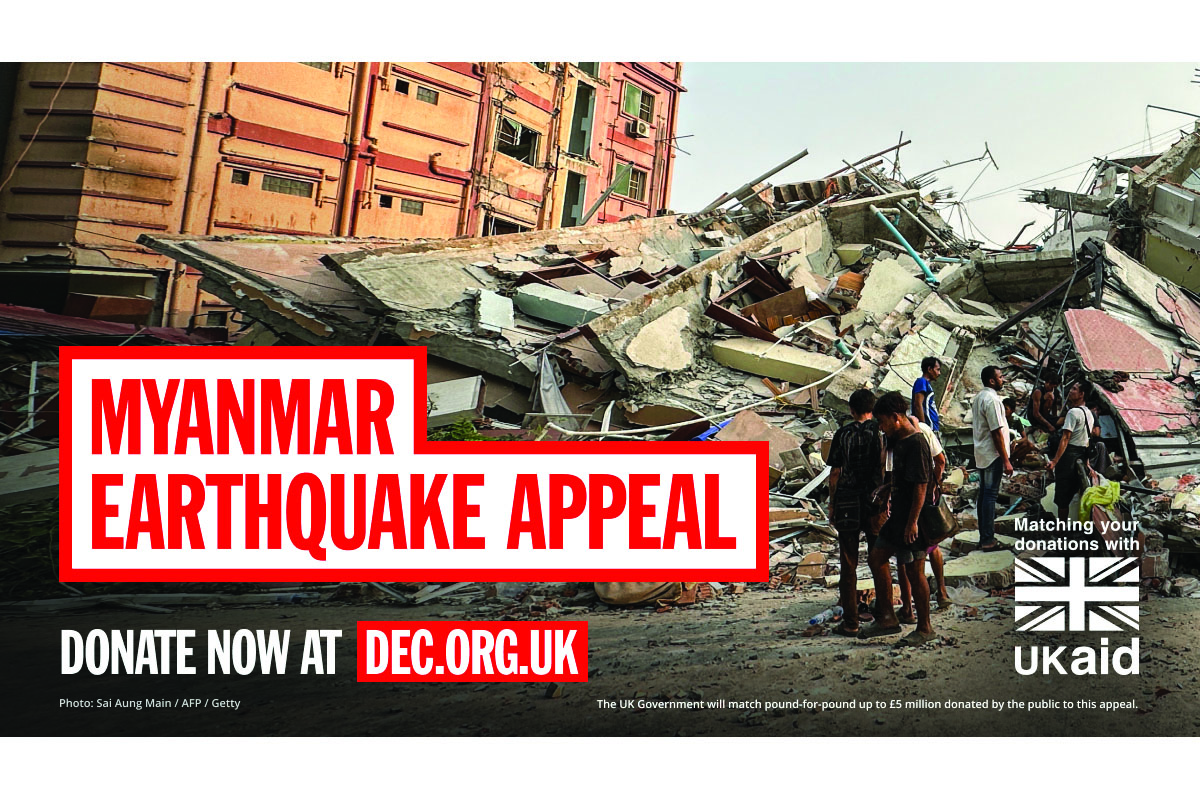
11 Apr 2025
Powerful earthquakes in Myanmar have caused catastrophic devastation. Survivors urgently need critical support. Please donate now.
The earthquakes compound an already underfunded humanitarian crisis
People in Myanmar were already facing a severe humanitarian crisis, with more than 19 million people – over a third of the population - in need of aid.
Across Myanmar, an estimated 3.5 million people were already internally displaced, with many living in temporary shelters, informal camps or jungles where they face severe shortages of basic services and resources such as food and clean water. The Sagaing region, which experienced some of the most severe shaking, was already hosting 1.3 million internally displaced people – a third of all internally displaced people in the country.
Now, millions of people in Myanmar have been exposed to the effects of the earthquake, affecting access to safe shelter, food, clean water and medical care
Children are among the most affected. More than half (55%) already live in poverty, while 45% of teenagers are out of school. Education and health services are severely disrupted and often at the brink of collapse. An outbreak of cholera was reported in June 2024. Overcrowded displacement sites are particularly susceptible to disease outbreaks. The region is currently experiencing extreme heat, with daily temperatures reaching into the high 30s°C, compounding health risks. As Myanmar approaches the rainy season, diseases such as cholera and malaria are only expected to further expand.
According to the Global Climate Risk Index, Myanmar is ranked among the top three countries most affected by extreme weather events such as cyclones and monsoon floods. In the 2024 rainy season, Myanmar experienced severe flooding. Crops and farmland were submerged, affecting food production and destroying livelihoods. 15 million people in Myanmar are facing acute food insecurity and approximately 2 million people are reported to be at risk of famine. 40% of young children lack access to nutritious meals.
DEC member charities need to rapidly scale their response
DEC members have a long established presence in Myanmar and member charities are already supporting affected communities. 14 of the 15 DEC member charities were already working in Myanmar directly or through local and national partners and are present in the regions most impacted by the earthquakes. They are currently assessing the situation with their local and national partners, with some already beginning to respond where needs are clear.
Local partners are a key part of any DEC response. Our member charities have strong local connections with the community, religious leaders, and elders, and have negotiated access locally to ensure they can get aid to the people who need it most. These relationships help ensure aid reaches intended recipients. The DEC plays an oversight role to ensure accountability and transparency.
How the DEC coordinates and brings added value to their response
The DEC membership contains a wide breadth of 15 of the UKs leading humanitarian charities, targeting support to vulnerable groups, which means we coordinate an effective UK charity response to all aspects of the disaster.
The DEC’s “helicopter view” of the response also enables us to spot duplication, plug gaps in programming, support cost-effective procurement, and ensure a high standard of transparency and accountability across the membership.
And we get funding to where it is needed, fast, with flexibility to adapt the response. Member charities will know in advance, before any public announcements, how much they can expect to receive from a DEC Appeal. This means they can begin to scale their operations immediately in anticipation of the highly flexible funding that they will receive from the DEC Appeal.
Spotlights: How DEC member charities are responding to this disaster
Shelter
Water, Sanitation and hygiene (WASH)
Multipurpose cash
Health
Food
Protection
In a recent DEC earthquake appeal, £15,986 funded a clinic to improve the nutrition of 8,735 women and children.
In a recent DEC earthquake appeal, £36,793 covered the cost to repair four damaged schools to help children get back to education.
In a recent DEC earthquake appeal, £99,803 provided 15,015 people with emergency ready-to-eat food after an earthquake.
Please consider making an urgent gift to our lifesaving appeal.
Pictured: People stand past the debris of a collapsed building in Mandalay, Myanmar, on 28 March 2025 after the earthquake.
Photo: Sai Aung Main/AFP/Getty.